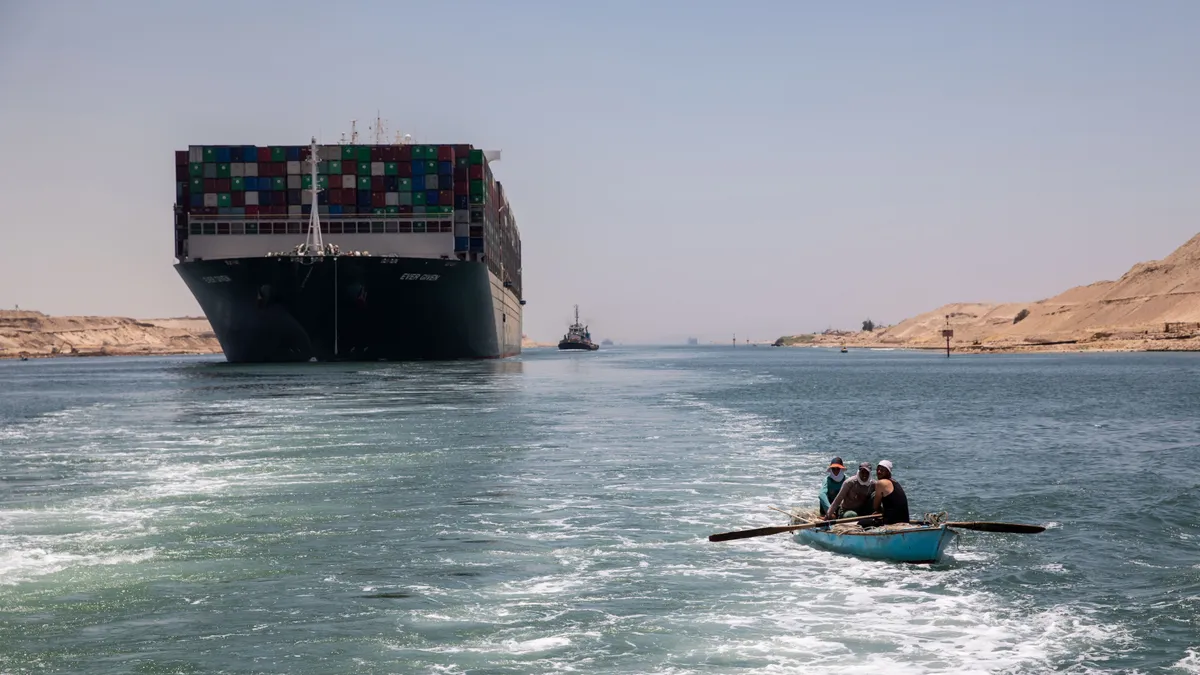Dive Brief:
- Major shipping lines are avoiding transiting the Suez Canal as Houthi-led attacks on cargo ships have recently escalated.
- MSC and Hapag-Lloyd, which have seen their ships directly targeted, said last week they would avoid using the shipping channel altogether. Meanwhile, CMA CGM and Maersk Line instructed their vessels to pause transit until further notice, the shipping lines said in customer advisories or emails to Supply Chain Dive.
- Meanwhile, Evergreen and OOCL announced they would temporarily suspend shipping cargo to and from Israel.
Dive Insight:
As carriers adjust their operations to avoid the risk in the Red Sea, shippers are left with fewer options for quick transit times as the Panama Canal is also facing risks of delays due to the ongoing drought.
Food and agriculture companies are closely monitoring the situation, with some rerouting shipments. Danone told Reuters Dec. 18 that most of its shipments have been diverted, and the company is prepared to use alternate routes if the situation continues beyond 2-3 months.
Fertilizer giant Mosaic has also re-routed some U.S. bound shipments around the Cape of Good Hope, according to Reuters, increasing transit times.
The added risks have also led to higher costs for shippers, in the form of rates, fees and time. In an email, Freightos said that ZIM, Hapag-Lloyd and Maersk have each added war risk surcharges ranging from $20 and $100 per container, and at least ZIM is charging higher rates to go around Africa.
The changing routes are leading to a buildup of ships around the channel. With carriers planning to avoid or halting operations by the Red Sea, as of Dec. 16, there were 40 vessels near the strait and over 100 vessels in the area, according to an emailed update from project44.
“Westbound containers will now have to travel around Africa, adding 7-14 days of transit. Rerouting vessels east, while potentially faster than Africa for lanes to the East Coast of the United States,” according to project44.
The Suez Canal Authority on Sunday acknowledged 55 ships had been rerouted since Nov. 19 in light of "ongoing tensions" in the Red Sea.
The number pales in comparison to the 2,128 vessels that transited the channel in the same span of time, Admiral Ossama Rabiee, chairman and managing director of the Suez Canal Authority, said in a press release. He also emphasized the byway remains the fastest route to transit from Asia to Europe, and that ships from Maersk, CMA CGM and MSC all transited the byway on Sunday despite their recent announcements.
Still, the rising number of attacks on commercial vessels have sparked concern from global leaders seeking to assure freedom of navigation, despite the Houthi militia group's attack on commercial vessels in response to the Israel-Hamas war.
"Transit in the Red Sea is more dangerous now than it was before because of these Houthi attacks on commercial shipping," John Kirby, National Security Council coordinator for strategic communications, told reporters on Friday.
Kirby added the White House is working "to bolster and strengthen the existing maritime forces" in the region to counter the threat, and would have more to share on a maritime task force in the coming days.
Sarah Zimmerman contributed to this story.













